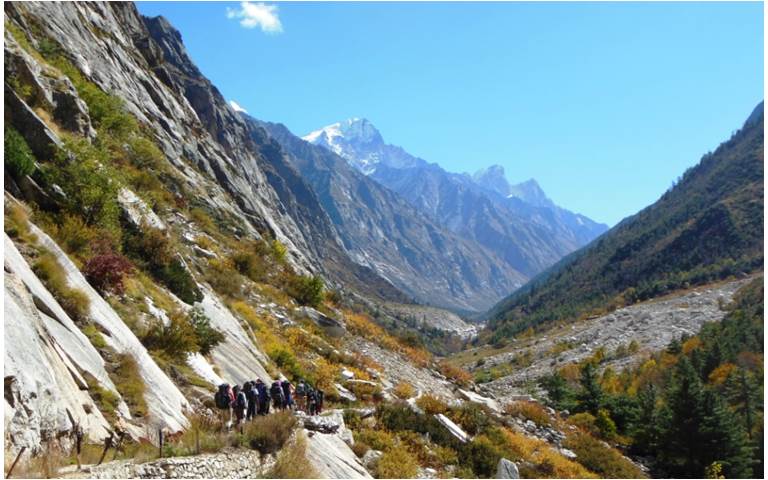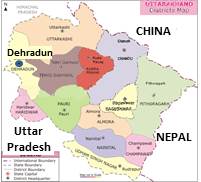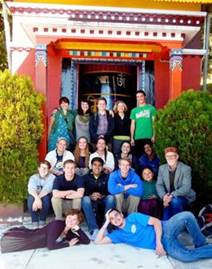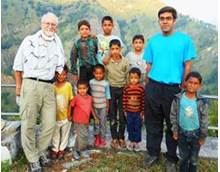By Rohan Lambore, Pittsburgh, PA
e-mail: Â RSL14@pitt.edu
Rohan, who grew up in Allison Park, PA, is a junior at the University of Pittsburgh, majoring in Political Science, Urban Studies and International-Area Studies.
Setting the Scene: In the fall of 2013, I had the privilege of studying abroad on the “Pitt in the Himalayas†program in conjunction with the University of Pittsburgh and the Woodstock School based in Mussoorie, India. Mussoorie is a hill station in foothills of Western Himalayas. At first I could not believe I would be spending all four months of fall semester in the shadow of some the world’s tallest mountains.
Throughout much of the spring 2013 term, I, along with the ever-generous staff in the University’s Study Abroad Office (SAO), set into motion what would evolve into the most rewarding experience of my life. Thus the packing and anxiety began with high anticipation throughout the preceding summer months as I prepared myself for what would be a once-in-a-lifetime opportunity.
Before I knew it, I was in the Hanifl Center, the outdoor education facility of the Woodstock International Boarding School in Mussoorie. Sitting at 6,800 feet above sea level, I looked out of my window admiring my surroundings: luscious green peaks peering over the misty clouds, the calls of numerous birds echoing across the valleys, and on the road below cheerful school children racing home to their villages that dotted the foothills.
I smiled as I reminisced on the exciting six-hour train journey from Delhi to Dehradun and then a winding road trip to Mussoorie that had brought me to such an abode. What was to come in the weeks and months ahead I could not say. However, I knew that it was this paradise that fourteen other students from the University of Pittsburgh and I would call home for the duration of my stay in India.
Not Your Typical Classes:Â My fellow cohorts and I excitedly began to observe our surroundings and tackle the lingering jet lag, but academic endeavors started almost immediately. On this specific study abroad program, students could choose from seven classes, and almost all chose to take five, equaling a full, 15-credit term. I chose two anthropology courses, one in creative writing, one in biodiversity, and one in advanced Hindi and Urdu. All classes were taught in the Hanifl Center, except for the Hindi/Urdu course, which was held at the renowned Landour Language School, just ten minutes away. Drs. Joseph Alter and Nicole Constable, professors at the University of Pittsburgh, led all anthropology coursework. Professor Sindhu Clark of the Woodstock school convened the biodiversity class, while Stephen Alter, an acclaimed Indian writer of fiction and nonfiction literature, taught the writing course.
My classes were specific to the location in which I was living and exploring: the Western Himalayas. The courses were unique, not resembling anything at a traditional university campus. The design and structure was outstanding: we could essentially live and learn about the Himalayan, and pan-Indian picture by reading and writing about the culture, traditions, and values of those living in the hills that surrounded us. Little did I know that the numerous treks, day visits, and day-long trips, would be utterly “divine†experiences.
Exploring the Mountains: I don’t know where to begin when I try to detail my journey around Uttarakhand during those days when I was not in the classroom in Mussoorie. How could my 14 fellow students and I essentially explore the entire state in only four months?
Our travels took us to Sainji, a small up-and-coming village an hour away from Woodstock that was benefiting from its Gharwal English-medium school recently instituted by the village chief and his Canadian-born wife. Soon after, we found ourselves overlooking the Tehri Reservoir and Dam, a
hydroelectric project that is seeking to renew the infrastructure across the Tehri Gharwal region in Uttarakhand. Among our day trips were Navdanya, an organic farm based in the plains outside Dehradun, as well as Assan Barrage, a bird watching point next to the Paonta Sahib Gurudwara in Himachal Pradesh, which were simply beautiful and insightful experiences.
We also visited both Rajaji and Jim Corbett National Parks where we saw a variety of animals up close, including the famed Indian elephant and quite luckily, an Indian tiger. These places were incredible complements to our various day-trips and village visits as we felt we had finally understood “the wild.â€
Nevertheless, our 6-day treks to Har-ki-Dun and Gangotri were on an entirely different level. The camping, climbing, picture taking, and for me, praying, were unparalleled experiences as we journeyed up the valleys to both the source of the Ganga River and the Tibetan border. Similarly, our week-long home stay in Majhkali, near the small hill station of Ranikhet, exposed us to the eastern part of Uttarakhand, the intrinsic beauty of the Nanda Devi mountain range, and the indigenous way of life in a Himalayan village. We concluded our trip with a rafting adventure down the Ganga herself, surviving a number of dangerous rapids, not to mention the freezing temperatures of the green-blue water.
Symbolically, we ended our rafting adventure at Rishikesh, with the Ganga Aarti on the banks of the river at an ashram, where we were able to thank the Gods for a truly successful semester. Then it was back up to Mussoorie to finish up the semester and celebrate. Before we knew it our journey was over and it was time to say our heavyhearted good byes.
Months later, I still find such experiences transformative: they not only showed me almost every corner of the region, but also helped me discover my own capabilities, limitations, and goals.
The Value of Studying Abroad: As an Indian-American, this trip was a dream come true for me. I learned more about my roots culturally, linguistically, and spiritually, I explored unimaginable locations, took amazing courses, made a plethora of friends, and brought home infinite memories. From playing with village children in Sainji to standing atop the Gomukh glacier in Gangotri, as a human being and as a Hindu, I am certainly more appreciative of what I know about “incredible India.†I dream of going back one day, doing it all over again and more. The people I met and spoke to, and the environments I immersed myself in were truly more than rewarding. I strongly encourage everyone to travel abroad, go places you never thought you could and explore as much as you can. Take it all in for what it is really worth.
Finally, a sincere Thank-You to all of those who made the inaugural year of the Pitt in the Himalayas program a great success both here at the University of Pittsburgh, and at the Woodstock School in Mussoorie, India. Three years of meticulous planning on their part made this happen. Without them I would certainly not be able to share my story. ♦




